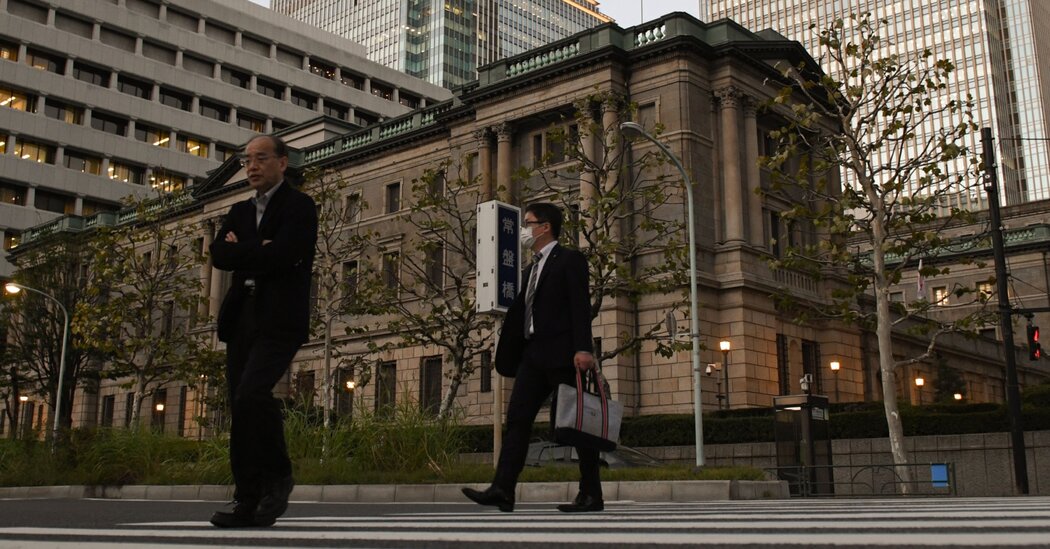The Bank of Japan said on Tuesday it would adjust its bond-buying policy and ramp up asset purchases — a surprising move as Japan faces economic pressure from rising inflation and a weak yen.
The change was seen as a sign that Japan could ease its insistence on ultra-low interest rates. That commitment has made the country a global outlier as other central banks around the world have raised their rates in an effort to fight inflation.
In a policy statement, the Bank of Japan said it would allow the yield on its 10-year bonds to move in a range of plus or minus 0.5 percent, widening the range from 0.25 percent, as it slows trading in domestic bonds, which has stagnated. At the same time, the bank will increase its monthly bond purchases from about $55 billion to $67 billion, the statement said.
The action shocked experts. Analysts had predicted that Japan’s famously inflexible central bank would stick to its current monetary settings at least through the spring, when the bank’s current governor, Haruhiko Kuroda, will step down.
“The consensus was completely that the BOJ would stand its ground,” said Stefan Angrick, a senior economist at Moody’s Analytics.
Inflation FAQs
What is Inflation? Inflation is a loss of purchasing power over time, meaning your dollar won’t go as far tomorrow as it did today. It is usually expressed as the annual change in prices for everyday goods and services such as food, furniture, clothing, transport and toys.
In its statement, the bank said it made the change in light of deteriorating bond market conditions, caused in part by “volatility in foreign financial and capital markets.”
For years, the Bank of Japan has capped interest rates to a tight margin to keep interest rates low. But the restrictive institutions, maintained by massive buying operations, brought trading in some government bonds to a near halt.
The bank said the policy change would help support an ultra-loose monetary policy that has provided households and businesses with a steady stream of cheap money for years. One of the pillars of that policy — interest rates approaching zero — remains unchanged, the bank said in its statement.
In a press conference following the release of the statement, Mr. Kuroda that it was “too early to consider revising or abandoning the current easing policy”.
Japan, the world’s third-largest economy, has felt the sting of skyrocketing food and energy prices due to supply chain grunts and the war in Ukraine. Although inflation was much lower than in other parts of the world, it stood at 3.6 percent in October, placing a heavy burden on households accustomed to decades of price stability and wage stagnation.
Making matters worse is a weak Japanese yen. Earlier this year, the currency traded at a decades-long low against the dollar, adding further price pressure to the economy, which relies heavily on imports.
The yen’s weakness was exacerbated by the Bank of Japan’s insistence on maintaining ultra-low interest rates, while other central banks around the world suddenly raised their own interest rates in an attempt to curb runaway inflation. The gap has devalued the yen as investors move money away from Japan in search of higher yields.
The currency has lost ground in recent weeks as other central banks slowed rate hikes. It rose in value after Tuesday’s announcement, rising more than 3 percent. A sharp rise in the currency’s value could help ease inflationary pressures on the economy.
Mr Kuroda has said he will stick to the bank’s current interest rate policy until the bank reaches a sustainable, demand-driven inflation rate of 2 percent, a level that policymakers say would create a virtuous cycle of growing corporate profits and wages. While current levels have exceeded that target, the bank argues that the price increases are largely driven by supply constraints, not the increased demand it wants to create.
In its statement, the bank said it would maintain its current inflation target until it could be maintained in a “stable manner”, adding that it would “not hesitate to take additional easing measures if necessary”.
Hisako Uenoreporting contributed.

